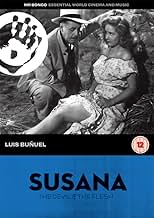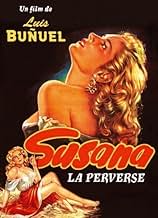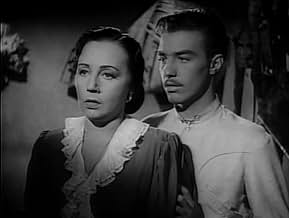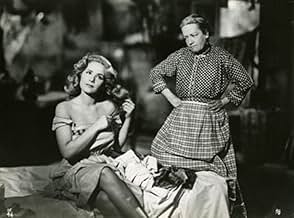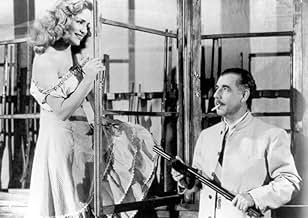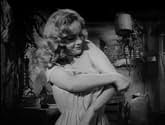CALIFICACIÓN DE IMDb
7.2/10
2.4 k
TU CALIFICACIÓN
Una joven inestable se fuga de un reformatorio y, con engaños encuentra, refugio con una familia bondadosa entre la que sembrará discordia.Una joven inestable se fuga de un reformatorio y, con engaños encuentra, refugio con una familia bondadosa entre la que sembrará discordia.Una joven inestable se fuga de un reformatorio y, con engaños encuentra, refugio con una familia bondadosa entre la que sembrará discordia.
- Dirección
- Guionistas
- Elenco
- Premios
- 1 nominación en total
Jesús García
- Empleado de Guadalupe
- (sin créditos)
Leonor Gómez
- Empleada de Guadalupe
- (sin créditos)
Opiniones destacadas
This film, judging by some of the reviews on this page, seems to have a provocative effect: one person seems to feel that Susana is evil incarnate and should have been killed. Perhaps that's the point: Bunuel may very well have meant her to be a caricature of the "bad girl." While she uses her sexuality as a weapon, she is merely provoking desires that were always there. The family she inserts herself into is an apparently happy one, and perhaps itself a stereotype, with feelings under the surface waiting to escape, just as Susana herself is an escapee. Her seduction technique is itself pointedly obvious, and Bunuel may very well have been telling something of a joke with this film, neither his best nor worst. And the actress who plays Susana does have nice shoulders.
Susana is a gorgeous , mean delinquent girl (Rosita Quintana) who escapes from a reform school of wayward women and deceptively finds shelter at home of good family . Along the way the sultry , ambitious young attempts to break an agreable family to get her egoistic aims . The apparently friendly young woman is invited to stay in the family home of the wealthy owner, Don Guadalupe (Fernando Soler) , proprietary a luxurious hacienda . He's a good man , well married , and living happily along with his wife (Maria Arcos) and only son (Luis López Somoza) . The-not-so-innocent girl becomes at the beginning an enjoyable guest but she ruthlessly uses everyone in his goals . There is also a foreman (Victor Mendoza) who is equally seduced and a snooper maid . Susana skillfully attempts to break the family harmony . As orderly lives of the members of the attractive family become into a frenzied chaos and unrest . Step by step she causes mayhem and discord among the decent members of the household.
The movie is well worthy thanks to razor-sharp performances as well as certain critical revealing the hypocrisies of modern society , in which a wayward girl uses the power of manipulation and eroticism to get her dark purports and eventually causing distresses until they are virtually struggling with each other . The picture features exceptional work by Rosita Quintana , she's magnificently charming as well as hateful playing the insidious Susana who attempts to dissect the harmonious family group . Her acting result to be a phenomenal precedent to the character who played Sue Lyon in ¨Lolita¨ or Carrol Baker in ¨Baby Doll¨ . The baddie female is really a selfish young , a manipulating babe who hates and seduces , as well as uses her feminine wiles to tempt all around . Furthermore, a beautifully cinematography in subdued black and white by José Ortiz Ramos , being shot , as usual , in Estudios Churubusco Azteca, Mexico City, Distrito Federal, Mexico. And atmospheric and appropriate musical score by Raúl Lavista.
The motion picture was competently directed by Luis Buñuel , belonging to his Mexican period and it won Ariel Awards, Mexico 1952 and Nominee Silver Ariel Best Young Actor Luis López Somoza . After shooting Spanish and French films as "Un Chien Andalou" (1929) , and ¨Age of Gold¨(1930) , ¨Hurdes tierra sin pan¨ (1936) , Buñuel went on his Mexican period in which he teamed up with producer Óscar Dancigers and after a couple of unmemorable efforts shot back to international attention with the lacerating study of Mexican street urchins in ¨Los Olvidados¨ (1950) , winning him the Best Director award at the Cannes Film Festival . But despite this new-found acclaim, Buñuel spent much of the next decade working on a variety of ultra-low-budget films, few of which made much impact outside Spanish-speaking countries , though many of them are well worth seeking out . As he went on filming "The Great Madcap" , ¨The brute¨, "Wuthering Heights", ¨El¨ , "The Criminal Life of Archibaldo De la Cruz" , ¨Robinson Crusoe¨ , ¨Death in the garden¨ and many others . And finally his second French-Spanish period , usually in collaboration with producer Serge Silberman and writer Jean-Claude Carrière with notorious as well as polemic films , such as : ¨Viridiana¨ , Tristana¨ , ¨The Discreet Charm of the Bourgeoisie" and his last picture , "That Obscure Object of Desire" . Susana rating : 7.5/10 . Essential and indispensable seeing for Luis Buñuel aficionados.
The movie is well worthy thanks to razor-sharp performances as well as certain critical revealing the hypocrisies of modern society , in which a wayward girl uses the power of manipulation and eroticism to get her dark purports and eventually causing distresses until they are virtually struggling with each other . The picture features exceptional work by Rosita Quintana , she's magnificently charming as well as hateful playing the insidious Susana who attempts to dissect the harmonious family group . Her acting result to be a phenomenal precedent to the character who played Sue Lyon in ¨Lolita¨ or Carrol Baker in ¨Baby Doll¨ . The baddie female is really a selfish young , a manipulating babe who hates and seduces , as well as uses her feminine wiles to tempt all around . Furthermore, a beautifully cinematography in subdued black and white by José Ortiz Ramos , being shot , as usual , in Estudios Churubusco Azteca, Mexico City, Distrito Federal, Mexico. And atmospheric and appropriate musical score by Raúl Lavista.
The motion picture was competently directed by Luis Buñuel , belonging to his Mexican period and it won Ariel Awards, Mexico 1952 and Nominee Silver Ariel Best Young Actor Luis López Somoza . After shooting Spanish and French films as "Un Chien Andalou" (1929) , and ¨Age of Gold¨(1930) , ¨Hurdes tierra sin pan¨ (1936) , Buñuel went on his Mexican period in which he teamed up with producer Óscar Dancigers and after a couple of unmemorable efforts shot back to international attention with the lacerating study of Mexican street urchins in ¨Los Olvidados¨ (1950) , winning him the Best Director award at the Cannes Film Festival . But despite this new-found acclaim, Buñuel spent much of the next decade working on a variety of ultra-low-budget films, few of which made much impact outside Spanish-speaking countries , though many of them are well worth seeking out . As he went on filming "The Great Madcap" , ¨The brute¨, "Wuthering Heights", ¨El¨ , "The Criminal Life of Archibaldo De la Cruz" , ¨Robinson Crusoe¨ , ¨Death in the garden¨ and many others . And finally his second French-Spanish period , usually in collaboration with producer Serge Silberman and writer Jean-Claude Carrière with notorious as well as polemic films , such as : ¨Viridiana¨ , Tristana¨ , ¨The Discreet Charm of the Bourgeoisie" and his last picture , "That Obscure Object of Desire" . Susana rating : 7.5/10 . Essential and indispensable seeing for Luis Buñuel aficionados.
Even as a "minor" work, I was a little surprised to find out that Luis Bunuel didn't care very much for the experience or final product of Susana (aka Devil in the Flesh). It is, I'll admit, not something I would rush out to tell my fellow Bunuel friends to see; part of that is practical, since it's only available on a VHS from the mid-80s and isn't in great condition even if found, but the other part is that it takes a real fan to appreciate it as a Bunuel film. Like Robinson Crusoe to an extent, though I think here more-so, it relies a bit for the audience member to understand what it is that attracted the great surrealist to the project. Temptation, pure and simple: this is at its best a story that allowed for the filmmaker to bask in a long-favored pastime, which was ticking off the uptight religious fanatics and purists who couldn't stand to see any kind of sensuality on the screen.
Sure, it definitely pales in comparison to the desire and temptation on parade and blasting at 11 in Un Chien Andalou or Viridiana. That's because Bunuel is keeping it on the down-low, which has its advantages and sort of disadvantages. On its own Susana is simply a melodrama, a story of this girl Susana (beautiful and talented if two-note Rosita Quintana) who escapes in one of those fun Bunuelian twists from a mental asylum to wind up on a rainy night in the care of a pretty religious farmhouse. She fits in with the chores and such, but also does her best to tempt the prudish on the farm (when she's asked to cover up she does, until no one's looking relatively), but winds up in a real pickle when tempting the wrong man.
And, on its own terms, it's a pretty decent melodrama. Some good performances, a few very good scenes of dialog and tension, but also on the scale of a very good soap opera all the same. I can see where Bunuel might have had some tension during the making; it feels and is a studio production, and as such he had to stay well within the limitations of the subject matter and low-budget. But it is worth seeing because it is still a Bunuel picture, with moments like that scene at night where the two men look on, tongues practically dangling out of their mouths, watching as Susana simply brushes her hair in silhouette, or a few moments where the twisted humor ratchets up a notch or too (it's rare, but worth it, if only in the unintended or just dated "scandalous" nature of the content). It's safe stuff coming from the director of the Phantom of Liberty, but it's not at all a bad movie either.
Sure, it definitely pales in comparison to the desire and temptation on parade and blasting at 11 in Un Chien Andalou or Viridiana. That's because Bunuel is keeping it on the down-low, which has its advantages and sort of disadvantages. On its own Susana is simply a melodrama, a story of this girl Susana (beautiful and talented if two-note Rosita Quintana) who escapes in one of those fun Bunuelian twists from a mental asylum to wind up on a rainy night in the care of a pretty religious farmhouse. She fits in with the chores and such, but also does her best to tempt the prudish on the farm (when she's asked to cover up she does, until no one's looking relatively), but winds up in a real pickle when tempting the wrong man.
And, on its own terms, it's a pretty decent melodrama. Some good performances, a few very good scenes of dialog and tension, but also on the scale of a very good soap opera all the same. I can see where Bunuel might have had some tension during the making; it feels and is a studio production, and as such he had to stay well within the limitations of the subject matter and low-budget. But it is worth seeing because it is still a Bunuel picture, with moments like that scene at night where the two men look on, tongues practically dangling out of their mouths, watching as Susana simply brushes her hair in silhouette, or a few moments where the twisted humor ratchets up a notch or too (it's rare, but worth it, if only in the unintended or just dated "scandalous" nature of the content). It's safe stuff coming from the director of the Phantom of Liberty, but it's not at all a bad movie either.
Buñuel's fifth feature, a small-budgeted moral parable made in Mexico, almost exclusively confined in the hacienda of a middle-class rancher owner Don Guadalupe (Soler). In an unusual tempest night, a sultry young woman Susana (Quintana) escapes from a reformatory and winds up at his doorstep, she is taken in by the kind-hearted matriarch Doña Carmen (Palou), Guadalupe's wife, as a domestic help. But soon the seemingly perfect family will disintegrate from inside when Don Guadalupe, his adolescent son Alberto (Somoza) and the masculine ranch helper Jesús (Mendoza) are all attracted to Susana's sex appeal, only the God-fearing maid Felisa (Arcos) sees through her innocuous front, but who can save the family from the ultimate rupture in the climax? Only Buñuel's deus ex machina.
In fact, the movie itself is grounded on a surreal precondition, in the opening scenes, Susana is locked up in a solitary cell, she entreats God in front of a cross materialised by the shadows of the metal bars, to give her a way out since she can not change her nature, which is made by God himself, so God grants her wish, as if he wants to cast a prank on us, releases the snake into the Garden of Eden. The script runs formulaic-ally where three different types of men all become the victims of Susana's seduction, Rosita Quintana successful captures her carnal allure with crude histrionics, for the spunky Jesús, she is the unattainable wench who promises him something sweet but refuses his pushing courtship; for the bookish Alberto, she is a proactive seductress from whom he is too green to resist, and for the patrician Guadalupe, she becomes a damsel in distress, who inadvertently rekindles his sexual urge which a married middle-age man can no longer obtain from his wife. While men are succumbing to their primitive lust, after seeing through her veiled pretence, Carmen and Felisa strike up, only that would be too late if Buñuel had opted for a more sinister finale.
The happy ending is a policy of appeasement, even the mare miraculously regains its vitality, but the re-gained conformity and harmony appear so ironic thanks to Buñuel's poker-faced mockery - how simple a weed in the field can bring about moral corruption to a conventional middle-class family. SUSANA is a fetching microcosm of Buñuel's views on human frailties, unambitious, simple but integral and surprisingly gratifying.
In fact, the movie itself is grounded on a surreal precondition, in the opening scenes, Susana is locked up in a solitary cell, she entreats God in front of a cross materialised by the shadows of the metal bars, to give her a way out since she can not change her nature, which is made by God himself, so God grants her wish, as if he wants to cast a prank on us, releases the snake into the Garden of Eden. The script runs formulaic-ally where three different types of men all become the victims of Susana's seduction, Rosita Quintana successful captures her carnal allure with crude histrionics, for the spunky Jesús, she is the unattainable wench who promises him something sweet but refuses his pushing courtship; for the bookish Alberto, she is a proactive seductress from whom he is too green to resist, and for the patrician Guadalupe, she becomes a damsel in distress, who inadvertently rekindles his sexual urge which a married middle-age man can no longer obtain from his wife. While men are succumbing to their primitive lust, after seeing through her veiled pretence, Carmen and Felisa strike up, only that would be too late if Buñuel had opted for a more sinister finale.
The happy ending is a policy of appeasement, even the mare miraculously regains its vitality, but the re-gained conformity and harmony appear so ironic thanks to Buñuel's poker-faced mockery - how simple a weed in the field can bring about moral corruption to a conventional middle-class family. SUSANA is a fetching microcosm of Buñuel's views on human frailties, unambitious, simple but integral and surprisingly gratifying.
In a stormy night, the sexy Susana (Rosita Quintana) escapes from the reformatory and reaches the ranch of Don Guadalupe (Fernando Soler), a family man that lives with his wife Dona Carmen (Matilde Palou) and their beloved son Alberto (Luis López Somoza). When they see Susana, Dona Carmen, who is Christian and Good Samaritan, gives shelter to the youngster that lies to them, but the old maid Felisa (María Gentil Arcos) is not convinced that she is telling the truth. The seductive Susana uses her beauty and sensuality to seduce Don Guadalupe, Alberto and the henchman Jesus (Víctor Manuel Mendoza) and destabilizing the family.
"Susana" is a melodramatic film by Buñuel with a simple story of a sexy woman that uses her body to seduce man and gets what she wants. The conclusion is moralist and conventional, but the film is good and Rosita Quintana is perfect for the role of Susana. My vote is seven.
Title (Brazil): "Susana"
"Susana" is a melodramatic film by Buñuel with a simple story of a sexy woman that uses her body to seduce man and gets what she wants. The conclusion is moralist and conventional, but the film is good and Rosita Quintana is perfect for the role of Susana. My vote is seven.
Title (Brazil): "Susana"
¿Sabías que…?
Selecciones populares
Inicia sesión para calificar y agrega a la lista de videos para obtener recomendaciones personalizadas
- How long is Susana?Con tecnología de Alexa
Detalles
- Fecha de lanzamiento
- País de origen
- Sitio oficial
- Idioma
- También se conoce como
- Susana: Carne y demonio
- Locaciones de filmación
- Productoras
- Ver más créditos de la compañía en IMDbPro
- Tiempo de ejecución1 hora 26 minutos
- Color
- Relación de aspecto
- 1.37 : 1
Contribuir a esta página
Sugiere una edición o agrega el contenido que falta


